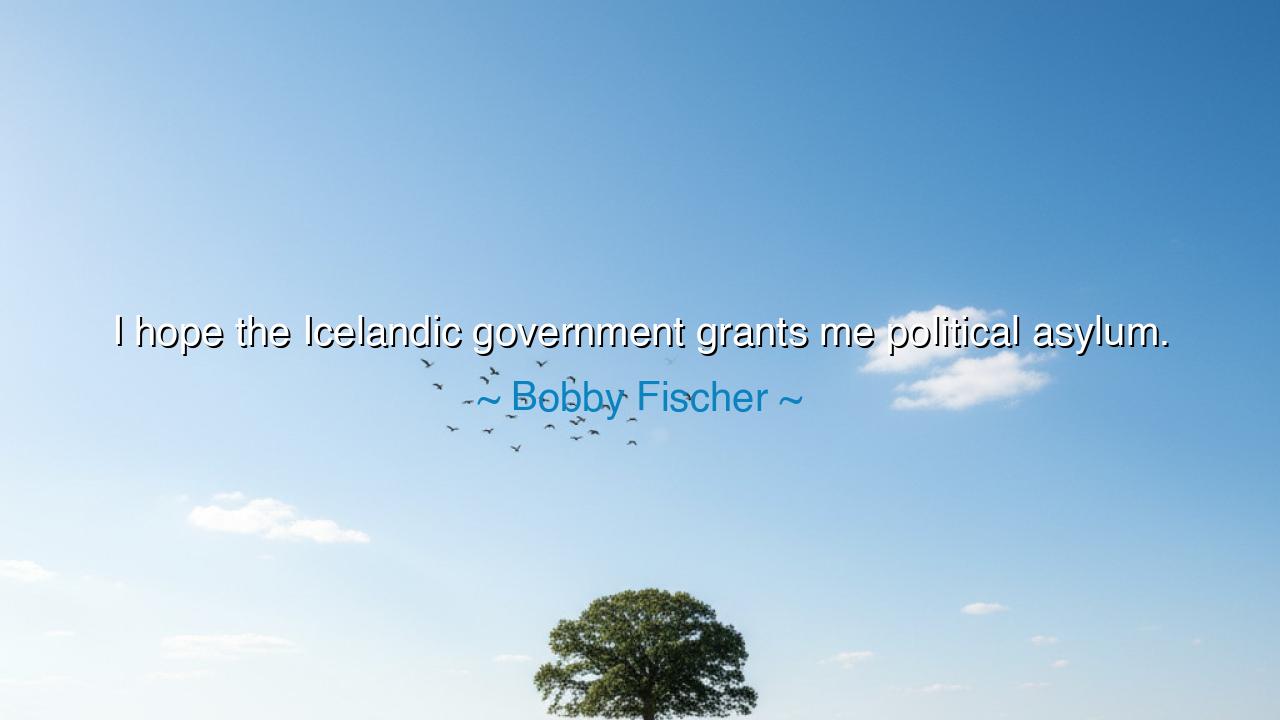
I hope the Icelandic government grants me political asylum.






When Bobby Fischer uttered the words, “I hope the Icelandic government grants me political asylum,” he was not merely seeking refuge from a nation — he was seeking refuge from the world itself. These words, spoken in the twilight of his life, carry the anguish of a man who once stood as a symbol of human genius and will, yet who found himself hunted by the very powers that once celebrated him. In that moment, Fischer’s plea became more than a personal cry; it became a lament for the solitary mind — the one who rises too high above the ordinary, and is punished for daring to stand alone.
The origin of this quote lies in 2004, when Fischer, once the world’s greatest chess prodigy and the conqueror of the Soviet empire on the chessboard, was detained in Japan at the request of the United States government. His crime was not one of violence or betrayal, but of defiance — he had played a chess match in Yugoslavia in 1992, in violation of U.S. sanctions during the Balkan conflict. For this, the same country that had once hailed him as a national hero now sought to imprison him. It was a cruel irony: the man who had defeated communism’s greatest minds during the Cold War was now branded a criminal by the nation he had glorified. His request for political asylum in Iceland, the land where he had once achieved immortality by winning the 1972 World Chess Championship, was not only a plea for safety — it was a poetic return to the one place that had treated him as a man, not a pawn.
Fischer’s story is one of genius consumed by rebellion. From the moment he emerged as a prodigy in the 1950s, he carried within him a storm — brilliance untempered by compromise, truth unsoftened by diplomacy. He saw hypocrisy everywhere: in governments, in institutions, in the media, even in the game he loved. As his fame grew, so too did his alienation. He withdrew from tournaments, attacked the very structures that had lifted him, and waged war not with opponents, but with systems. His final years were marked by exile, paranoia, and outrage — yet beneath it all burned the same fierce independence that had once made him unstoppable. His plea for asylum was thus not just political; it was spiritual — the cry of a man who could not live in a world ruled by conformity and deceit.
In this light, Fischer’s words carry the weight of a universal truth. Every age has its outcasts — those who refuse to bend to the winds of power, and who, in their defiance, are cast aside. Socrates was forced to drink hemlock for questioning authority; Galileo was silenced for daring to reveal the truths of heaven; Aleksandr Solzhenitsyn was exiled from his homeland for exposing tyranny. Fischer stands among them — not as a saint, but as a reminder that the price of freedom is often isolation. To seek asylum, then, is not always to flee from justice, but sometimes to flee from injustice disguised as law.
Yet there is another, deeper meaning to Fischer’s cry. When he said, “I hope the Icelandic government grants me political asylum,” he was not simply asking for a place to live — he was asking for a place to be left in peace. The warrior of the mind, weary from battle, longed for silence. Iceland, with its cold mountains and endless horizons, became a fitting sanctuary for a man who had waged his greatest wars within himself. It was there that he would live out his final years — alone, enigmatic, and unrepentant — a figure both tragic and magnificent.
Fischer’s life reminds us that genius is both gift and curse. The same clarity of vision that allows one to see deeper truths also reveals the world’s hypocrisies too sharply to bear. His plea for asylum reflects a yearning shared by all who have ever felt alien to their own society — the desire to find a place where truth is not punished, where individuality is not condemned. It is a cry as old as human civilization: the yearning of the soul for refuge from the corruption of the crowd.
The lesson of his words is not to glorify defiance for its own sake, but to understand that freedom of thought must always be defended, even when it isolates us. The world will always fear those who think too deeply, who question too boldly, who refuse to submit. Yet it is through such souls that progress is born, and truth preserved. Fischer’s exile is a warning and a testament — that a society which punishes its thinkers digs its own grave.
Therefore, let his story be remembered not merely as the fall of a champion, but as the eternal struggle between the individual and the institution. When he asked Iceland for asylum, he asked humanity for understanding — a place where the mind could live without chains. May his words remind us that the highest form of victory is not conquest, but the courage to remain true to oneself, even when the whole world turns away.






AAdministratorAdministrator
Welcome, honored guests. Please leave a comment, we will respond soon